
Defense Secretary Robert Gates kicked off a round-the-world trip in Singapore Saturday with a speech to a conference of Asian defense leaders.
Some Asian officials believe U.S. commitments in Iraq and Afghanistan will mean a reduced security presence in Asia. In fact, the Pentagon plans to cut down the number of troops permanently based in the Far East.
"We are an Asian power with significant and long term political, economic and security interests," Gates said. "Our commitments elsewhere notwithstanding, we will fulfill our commitments in Asia."
Apparently in the intellectual salons of Asia, there is a lot of talk about how America is neglecting the continent. So, Gates came armed with a number of examples to show otherwise.
"From its inception as a young republic, the United States has been a Pacific nation," Gates said.
Historians may quibble with that --California and most western states didn't become part of America until around 1850. Nevertheless, there is a strong argument that today, America is a Pacific nation — and that has a lot to do with economic co-dependency.
And then there is the white elephant in the room: U.S.-China relations. Last week, the Pentagon released its annual report on China's growing military power. The Chinese hate the report in general, but particularly this one. It accuses Beijing of hiding large chunks of its military spending.
"We are concerned about the opaqueness of Beijing's military spending and modernization programs," Gates said at the session — words that were as close as he would come to criticizing China.
It still rankled the top Chinese representative at the conference. Lt. Gen. Zhang Qinsheng, China's intelligence chief, called Washington's report "inaccurate" and "untrue."
But there is enough concern in the United States over China's ultimate military objectives that Washington and Beijing will soon set up a military "hotline" similar to the one established with Moscow at the height of the Cold War.
Copyright 2022 NPR. To see more, visit https://www.npr.org. 9(MDAzMjM2NDYzMDEyMzc1Njk5NjAxNzY3OQ001))






